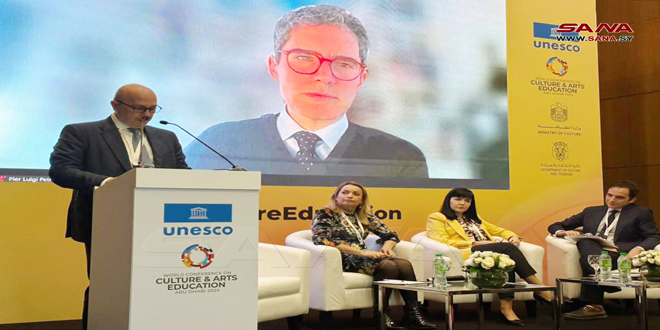On February 19, 2024, in Abu Dhabi, alongside the Global Conference on Culture and Arts Education at the Abu Dhabi National Exhibition Centre (ADNEC), the Syrian Trust for Development, in collaboration with the UNESCO Chair for Intangible Cultural Heritage and Comparative Law at the Sapienza University of Rome, Italy, held a dynamic discussion session.
Titled “Integrating Intangible Cultural Heritage into Education: New Experiences and Horizons,” the session gathered experts from Africa, Latin America, Asia, and Europe to explore the incorporation of intangible cultural heritage into educational systems.
Fares Kallas, a member of the Board of Trustees, emphasized the session’s relevance to the ongoing UNESCO conference and the diverse societies represented. He highlighted the critical need to safeguard intangible cultural heritage amidst the challenges and opportunities presented by globalization and the digital era. Kallas underscored the urgent need for protection and the shared duty of preserving and transmitting the knowledge, skills, and practices that embody the essence of cultures.
He posed a central question regarding the enhancement of educational methodologies to safeguard intangible cultural heritage effectively. Addressing this question, Kallas noted, would uncover innovative educational approaches that reconcile tradition with modernity.
Kallas also pointed out the significant impacts of conflicts, wars, and displacement on intangible cultural heritage and the substantial challenges faced by communities under economic sanctions and technological divides.
Highlighting the session’s importance, Kallas stressed the collective responsibility and the insights gained from diverse perspectives, aiming for a more inclusive and adaptable strategy for integrating intangible cultural heritage into education.
The conference attracted culture and education ministers worldwide, focusing on adopting a UNESCO framework for culture and arts education. It aimed to foster collaboration among UN agencies, intergovernmental organizations, UNESCO networks, and partners in culture and education, sharing innovative practices and ideas. Additionally, it supported the strengthening of the World Alliance for Arts Education.
UNESCO Member States unanimously endorsed a new global framework for culture and arts education, committing to several key objectives. These include enhancing the role of culture and arts education in teacher training, emphasizing local and indigenous cultures in education, and improving the recognition of artistic and cultural skills within professional realms.
Note from the Observer:
Syria Trust for Development is considered an umbrella for organizations controlled by Syria’s first lady Asma al-Assad.
This article was translated and edited by The Syrian Observer. The Syrian Observer has not verified the content of this story. Responsibility for the information and views set out in this article lies entirely with the author.


